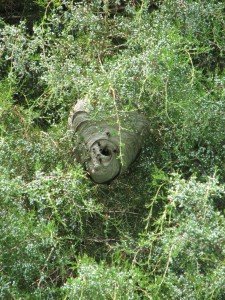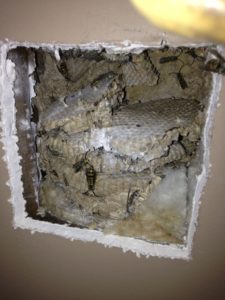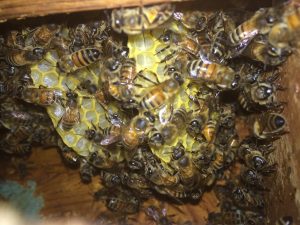
Hornet, Yellowjacket & Hive Removal in Alpharetta, GA
Bald-faced Hornets, Yellowjackets, and Honeybees are an everyday challenge in Alpharetta neighborhoods. Whether the hive is hanging from a tree in Windward, tucked in a soffit near Avalon, or underground by a fence line off Kimball Bridge Rd, our team provides Fast, Affordable, and Certified Hive Removal Services across Alpharetta.
For more than 15 years, homeowners in ZIP codes 30004, 30005, 30009, and 30022 have trusted us for hornet nest removal, yellowjacket dig-outs, and safe honeybee relocations.
BALD FACED HORNET NEST REMOVAL

Bald-faced hornets are among the most aggressive stinging insects we deal with. Their nests look like large, gray paper “mummies” and are often found on trees, eaves, doorways, and soffits.
We never “spray and run.” Instead, we contain and remove the entire nest—including the Queen and pupae—at once. This method ensures the colony cannot return.
Any hunters that were out foraging may return, but they are disoriented without their queen. The number of returning hornets (usually a half dozen or so, depending on hive size) drops quickly, and the entire problem is resolved within about a week.
YELLOWJACKET NEST REMOVAL

Yellowjackets in Alpharetta are most commonly found underground or inside wall and ceiling voids. We handle both removal types:
- Dig-Out (In-Ground): We excavate the hive completely, removing nest and queen so they cannot rebuild.
- Cut-Out (Wall or Void): We remove the hive in a controlled manner, then use plastic sheeting to tape up the hole we cut into the wall or structure. Once you are hive-free, we provide guidance on how to proceed with repairs.
Because yellowjackets can swarm from simple vibrations like walking by or mowing, it’s important to let trained professionals handle them safely.
Where We Commonly Find Yellowjackets in Alpharetta
- Decks, stair stringers, and backyard structures
- Underground nests near fences and yard edges
- Wall and soffit voids in homes
Certified Honeybee Hive Removal & Relocation in Alpharetta

Georgia law now requires companies to be Certified for Honeybee Hive Removal—and we are. We do everything possible to safely relocate colonies to local beekeepers so they can continue to thrive.
Beehives in Alpharetta are often found between walls, in attic voids, or hanging from structures. Sadly, many are sprayed by mistake, harming the colony. Even in those cases, we carefully remove all comb, brood, and honey to prevent pests such as ants, roaches, and rats from being drawn in.
Whenever possible, we use chemical-free relocation methods so the hive can continue to live on. If every safe option has been exhausted and the hive is truly inaccessible, there is a remote chance we may have to treat the hive to eliminate the situation.
Typically we remove the hive, Queen, Pupae and Honeycomb and place them carefully in a temporary hive box then we donate them to beekeeper clubs.
What To Expect When You Hire Us
- Convenience: For outdoor nests, you don’t need to be home. For indoor hives, we’ll need access.
- Response Time: We answer our phones after hours, and we schedule most calls the same day or the next day.
- Value: Customers tell us our prices are among the lowest in Alpharetta.
- Quality: Our attention to detail makes us stand out and keeps infestations from recurring.
Serving Alpharetta Neighborhoods & Beyond
We proudly provide hornet, yellowjacket, and honeybee hive removal across Alpharetta, including Avalon, Alpharetta City Center, Windward, Crooked Creek, North Point, Webb Bridge, and nearby subdivisions. We’re not too far from GA-400 exits 9–12, which means fast response times for all of Alpharetta.
TOP FAQ’s for Hornet Nest Removal, Yellowjacket Hive removal and Honeybee Relocations
Q: How can I tell if I have a yellowjacket or bald-faced hornet nest on my property?
A: Yellowjackets usually nest underground or inside wall voids, while bald-faced hornets build large, gray, papery nests above ground—often in trees, bushes, or under eaves. If you see fast-moving, aggressive stinging insects entering and exiting a concentrated spot, there’s likely a nest.
Q: Is it dangerous to remove a yellowjacket or hornet nest myself?
A: Yes. Both species are highly aggressive and capable of delivering multiple painful stings. DIY removal often leads to swarming and serious injury. Professional removal ensures safety and thorough elimination.
Q: What time of year are yellowjackets and hornets most aggressive?
A: Late summer through early fall. This is when colonies are at full strength and food becomes scarce, making them more territorial and likely to sting unprovoked.
Q: Can hornet or yellowjacket nests be removed in a single visit?
A: Yes. In most cases, nests are completely removed and fully treated in one visit. In the rare case where the hive cannot be physically removed and a deep hive treatment is required—typically for a large colony—a second treatment may be necessary to fully eliminate activity.
Q: Will hornets or yellowjackets return after the nest is removed?
A: Once a nest is fully treated and removed, that colony will not return. However, new colonies may attempt to nest in the future if entry points or nesting conditions remain favorable.
Q: What does a bald-faced hornet nest look like?
A: It resembles a gray, papery football with a swirling texture and a single entrance hole, typically hanging from trees, bushes, or structures like eaves and overhangs.
Q: Can hornets or yellowjackets build nests inside walls or attics?
A: Yes. Yellowjackets frequently access wall voids, attics, and soffits through small gaps, making their nests difficult to detect until significant activity is observed.
Q: Are hornets and yellowjackets aggressive even if you don’t disturb them?
A: Yes. As colonies grow, they become more defensive. Even unintentional proximity to the nest can trigger stings, especially during late summer.
Q: What’s the difference between hornets, yellowjackets, and honeybees?
A: Hornets and yellowjackets are wasps—aggressive predators that can sting repeatedly. Honeybees are pollinators, less aggressive, and protected in many areas. Correct identification is crucial before removal.
Q: Do you relocate honeybee hives instead of exterminating them?
A: Yes. Honeybee colonies are never exterminated. We partner with local beekeepers to safely remove and relocate the hive whenever possible.
Q: Is honeybee hive removal different from hornet or yellowjacket nest removal?
A: Yes. Honeybee removals typically involve careful access, possible structural opening, and live relocation. Hornet and yellowjacket nests are handled with targeted treatment and full removal on-site.
Q: Can hornets or yellowjackets cause property damage?
A: Yes. Hidden nests can damage insulation, drywall, and even wiring. Odor and staining may also occur if a nest decomposes inside walls or ceilings.
Q: Are hornets and yellowjackets beneficial insects?
A: While they do help control insect populations, their aggressive nature and the risk of stings often outweigh their benefits when nesting near homes or businesses.
Q: How can I prevent hornets or yellowjackets from nesting near my home?
A: Seal soffits, vents, and siding gaps. Keep trash sealed, remove food and drink spills outdoors, and avoid leaving pet food outside. Springtime preventative treatments may reduce nesting attempts.
Q: Do you offer emergency or same-day service for aggressive yellowjacket or hornet nests?
A: Yes. We prioritize urgent removal of nests that pose a safety risk—especially in high-traffic, residential, or commercial areas where people or pets are at risk.
